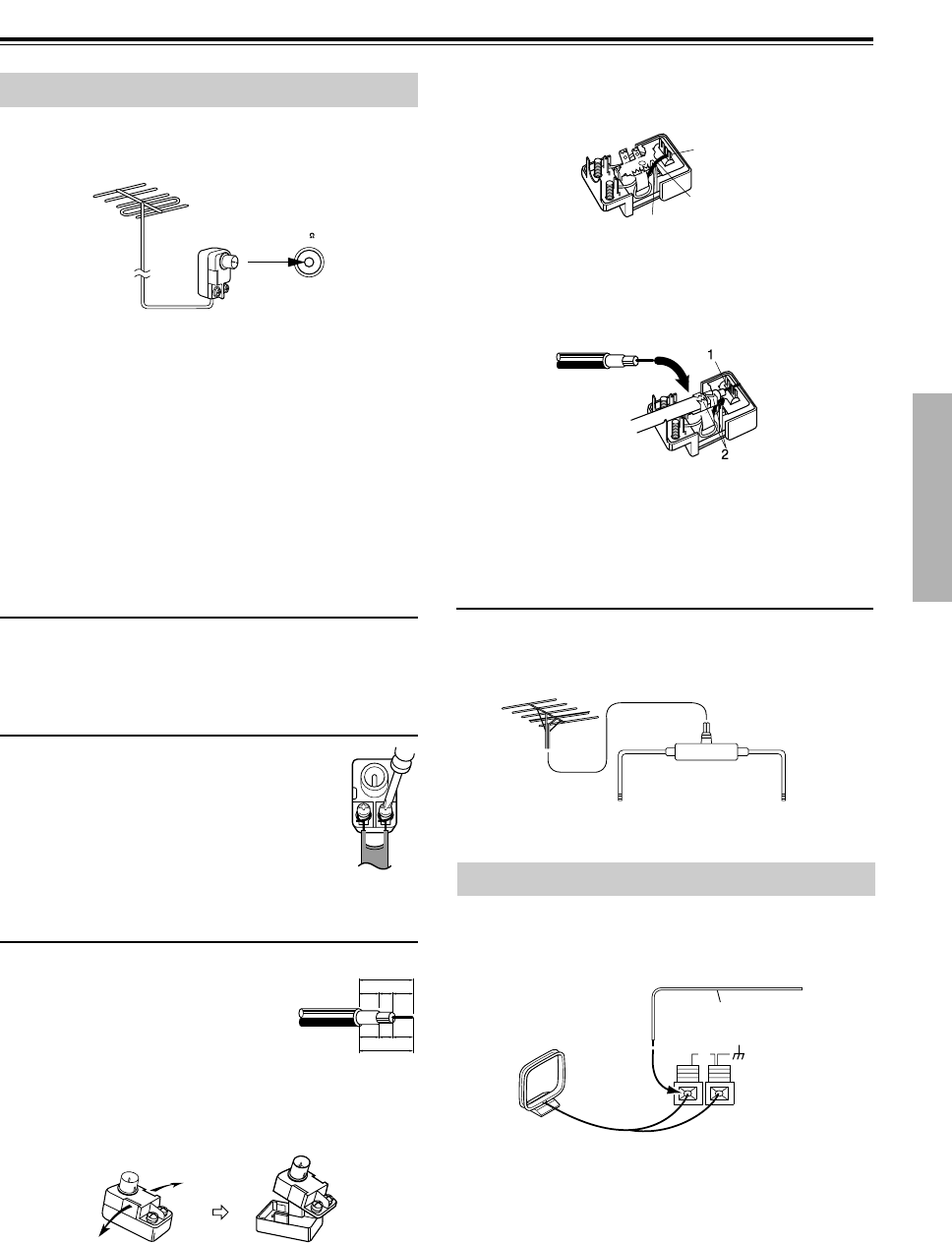
15
Connecting an Outdoor FM Antenna
If you cannot achieve good reception with the supplied indoor FM
antenna, try a commercially available outdoor FM antenna instead.
FM
75
Notes
• Outdoor FM antennas work best outside, but usable results can
sometimes be obtained when installed in an attic or loft.
• For best results, install the outdoor FM antenna well away for
tall buildings, preferably with a clear line of sight to your local
FM transmitter.
• Outdoor antenna should be located away from possible noise
sources, such as neon signs, busy roads, etc.
• For safety reasons, outdoor antenna should be situated well
away from power lines and other high-voltage equipment.
• Outdoor antenna must be grounded in accordance with local
regulations to prevent electrical shock hazards.
Using the 75/300-ohm Antenna Adapter
The 75/300-ohm antenna adapter can be used to connect an FM
antenna using either 75-ohm coaxial cable or 300-ohm twin-core
flat cable.
Connecting 300-ohm Flat Cable
1. Using a screwdriver, loosen the two
screws on the adapter, wrap the bare
wires around the screws, and then
retighten them, as shown.
2. Plug the adapter into the 75 Ω
socket.
Connecting 75-ohm Coaxial Cable
1. Strip and prepare the 75 ohm
coaxial cable, as shown.
2. Using your fingernails or a small screwdriver,
lever the adapter’s tabs outward and remove
the cover, as shown.
Connecting an Outdoor AM Antenna
If good reception cannot be achieved using the supplied AM loop
antenna, an outdoor AM antenna can be used in addition to the loop
antenna, as shown.
Outdoor AM antennas work best when installed outside
horizontally, but good results can sometimes be obtained indoors
by mounting horizontally above a window. Note that the AM loop
antenna should be left connected.
Outdoor antenna must be grounded in accordance with local
regulations to prevent electrical shock hazards.
Connecting antennas
AM
AM loop antenna
Outdoor antenna (aerial)
Insulated antenna cable
3. Move the small wire inside the adapter from
position A to position B, as shown.
4. Insert the central conductor (1), as shown, and
use a small pair of pliers to clamp the shielding
and outer insulation sections of the cable (2),
as shown.
Make sure the shielding is not touching the central conductor.
5. Refit the adapter’s cover, and then plug the
adapter into the 75 Ω socket.
Using a TV/FM Antenna Splitter
It’s best not to use the same antenna for both FM and TV reception,
as this can cause interference problems. If circumstances demand
it, use a TV/FM antenna splitter, as shown.
✦
✦
✦
✦
✦
✦
✦
✦
✦
✦
✦
6
mm
3
mm
6
mm
1/4" 1/8" 1/4"
15 mm
5/8"
Position A
Wire
Position B
TV/FM antenna splitter
To AV reciever
To TV (or VCR)
✦
✦
✦
✦
✦
✦
✦
✦
✦
✦
✦
✦
✦
✦
✦


















